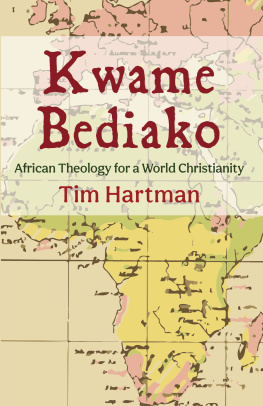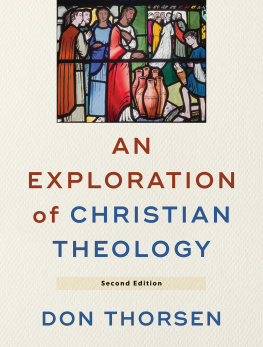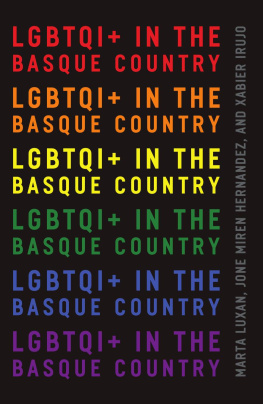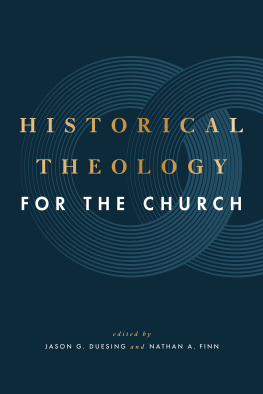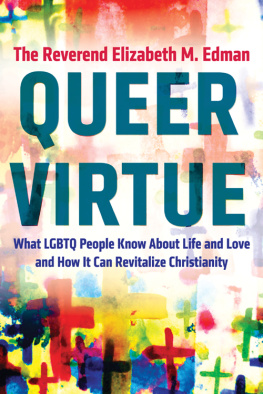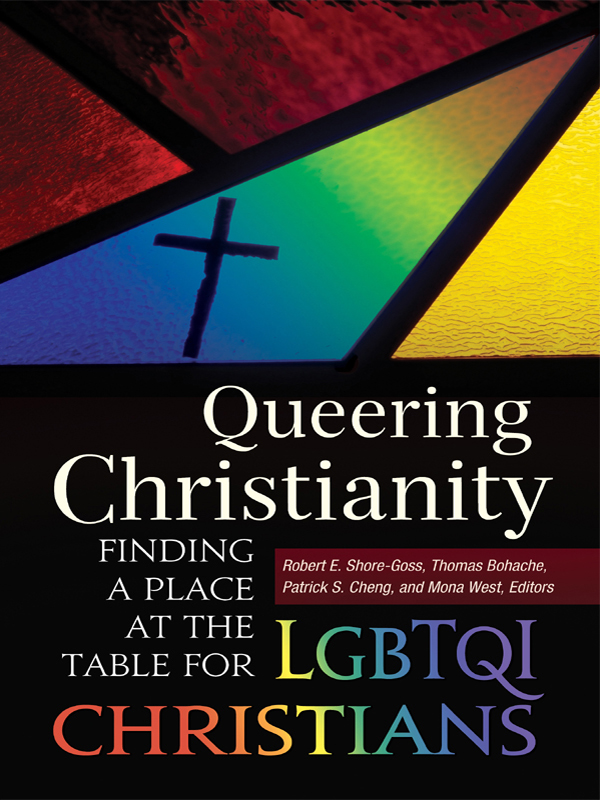
Queering Christianity
Finding a Place at the Table for LGBTQI Christians
Robert E. Shore-Goss, Thomas Bohache, Patrick S. Cheng, and Mona West, Editors

AN IMPRINT OF ABC-CLIO, LLC
Santa Barbara, California Denver, Colorado Oxford, England
Copyright 2013 by ABC-CLIO, LLC.
All rights reserved. No part of this publication may be reproduced, stored in a retrieval system, or transmitted, in any form or by any means, electronic, mechanical, photocopying, recording, or otherwise, except for the inclusion of brief quotations in a review, without prior permission in writing from the publisher.
Library of Congress Cataloging-in-Publication Data
Queering Christianity : finding a place at the table for LGBTQI Christians / Robert E. Shore-Goss, Thomas Bohache, Patrick S. Cheng, and Mona West, editors.
pages cm
Includes index.
ISBN 978-1-4408-2965-9 (hardback) ISBN 978-1-4408-2966-6 (ebook)
1. Church and minorities. 2. HomosexualityReligious aspectsChristianity. I. Shore-Goss, Robert.
BV639.M56Q44 2013
261.8'35766dc23 2013006776
ISBN: 978-1-4408-2965-9
EISBN: 978-1-4408-2966-6
17 16 15 14 13 1 2 3 4 5
This book is also available on the World Wide Web as an eBook.
Visit www.abc-clio.com for details.
Praeger
An Imprint of ABC-CLIO, LLC
ABC-CLIO, LLC
130 Cremona Drive, P.O. Box 1911
Santa Barbara, California 93116-1911
This book is printed on acid-free paper 
Manufactured in the United States of America
Dedicated to the prophetic vision of radical inclusion and human rights for all of Rev. Troy Perry
Contents
Robert E. Shore-Goss
Douglas Smith
Patrick S. Cheng
Robin H. Gorsline
Patrick S. Cheng
Robert E. Shore-Goss
Megan More
Robert E. Shore-Goss
Thomas Bohache
Thomas Bohache
Bryce E. Rich
Axel Schwaigert
Rachelle Brown
Kerri Mesner
Nic Arnzen with the Cast and Friends of Corpus Christi
Robert E. Shore-Goss
Thomas Bohache
Mona West
Joseph Shore-Goss
Joan M. Saniuk
Neil Thomas
Lea Brown
Mona West
Joseph Shore-Goss
Jim Mitulski, Donna Hamilton, and Nancy Hall
Introduction: Queering the Table
Robert E. Shore-Goss
Tony growled, You know Troy, I learned one thing from this experience, nobody likes a queer. Were just a bunch of dirty queers and nobody cares about dirty queers.
Somebody cares. Troy responded.
Who?
God cares.
Tony laughed bitterly, and said, Oh, come on Troy, God doesnt care about me. With that, he turned and left. I knelt down and said, All right God, if its Your will; if You want me to see a church started as an outreach into our community, You just let me know when. And that still, small voice let me knownow!
Rev. Troy Perry
Before Stonewall, Troy Perry founded a movement that became a church, spreading throughout the United States and globally. On October 6, 1968, Troy followed the promptings of the Spirit and celebrated the first worship service of the Metropolitan Community Church (MCC) in a rented house in Huntington Park, California. Twelve people responded to an ad run in The Advocate Magazine and attended that service. During the first Sunday service, Troy told the attendees that he intended to develop a church that would reach homosexuals everywhere. His message was three-pronged: salvation, community, and social action.
Toward the end of the service, Perry offered a prayer over the bread and grape juice and offered those who had been excluded to come and receive communion. He dramatically and spiritually ritualized the exclusion that the gays and lesbians in attendance had experienced through their churches politics of the table. They had been denied access to the sacrament because of their sexual orientation, for they had not been welcomed into communion with God and the church. This ritual is now repeated in many MCC churches during worship at the end of the communion table prayer with the invitation: You neither need to be a member of MCC, nor any church nor even be a Christian. All are welcome to Gods table. In that simple ritual proclamation is embodied a profound proclamation that the unconditional grace of God is available to all people. God surrounds all human beings from birth to death with inclusive, incarnational love and redemptive care. This gift of love is nothing other than Gods self-communication of divine love and forgiveness. There are three notions embodied in MCCs ritual. First, Gods grace is radically inclusive and without conditions. Second, no one is turned away, for the table is open. Hospitality supersedes all denominational politics of the table. Finally, the open invitation expresses a central practice of Jesus ministry that every person is loved equally by God. Combined, this ritual invitation would become the core mission of MCC: Gods radical inclusive love.
Many churches fail to recognize Gods indiscriminate or even promiscuous love for all people in Jesus table practice of meals and table companionship with sinners. The symbolic power to partake of communion by excluded queer Christians should not be underestimated. In her study of MCC, Melissa Wilcox observes how individuals, when they start attending, may take weeks or even months before they approach the communion table because of the exclusionary practices and messages within their former churches. Same-sex couples may come and receive communion as a couple, then receiving a prayer blessing from one of the celebrants. She concludes, The habitus that conveys second class status to the world and oneself is thus broken during the MCC ritual.table fellowship. At Queer Conference of queer theologians and religious leaders at Emory University, the late feminist, queer theologian Marcella Althaus-Reid shared with me how MCC Edinburgh brought her back to Christian communion. She found communion to be an alienating and exclusive experience in many churches but found the MCC open invitation at table and the blessing meaningful.
The editors and contributors understand that the core queer theologies are based on the open invitation to communion table and that we have been comprehended as sinners. We may be sinners, but we believe that we are also companions with the risen Christ in meals remembering the inclusive grace celebrated in his first meal, his Last Supper, and his meal at Emmaus on the beach of the Lake of Galilee. The dynamics of the open communion table incarnate a dynamic of inclusionary grace.
FINDING A PLACE AT THE TABLE
The sad divisions of Christs Church are exacerbated by rules and regulations that create barriers to the receiving of Gods free grace at the table. Issues of intercommunion, closed communion, and open communion divide Christians and their practices at table. Nowhere are the divisions more realized than in a closed Church who invites a guest to the Lords house and then dictates that the guest cannot sit and eat at the table with the family. Such behavior, at best, is rude etiquette and, at worst, a profound betrayal of the table practices of Jesus.
One of the scandals of contemporary Christianities is their politics and exclusion at the communion table. It neither expresses church unity, unless ecclesial definitions are narrowed down to a specific denomination, nor expresses inclusivity. Closed communion is the practice of restricting the serving of the elements of communion to a particular church, denomination, sect, or congregation. Although the meaning of the term varies slightly in different Christian theological traditions, it generally means a church or denomination limits participation either to members of their own church, members of their own denomination, or members of some specific class (e.g., baptized members of evangelical churches, children who have made their first communion, closeted or nonpracticing queer folks).
Next page

